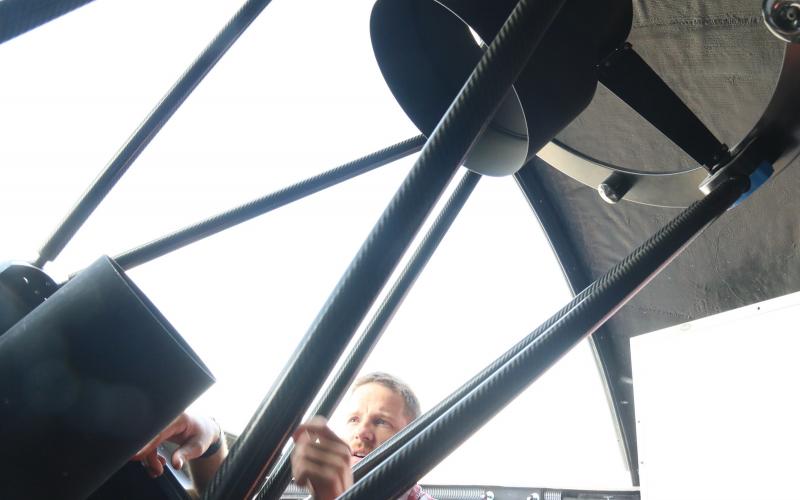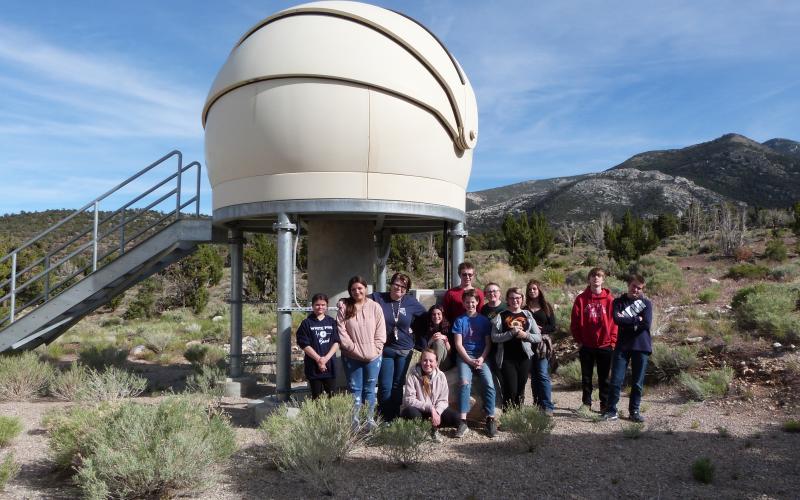White Pine Middle School teacher and students highlighted at Great Basin National Park Astronomy Festival


On Friday, September 6, Dr. Cameron Pace was the guest speaker at the Great Basin National Park Astronomy Festival. Dr. Pace is a professor of physics at Southern Utah University located in Cedar City. He spoke about his experience working for the last 10 years with the Great Basin Observatory (GBO) located in Great Basin National Park.
The GBO is a project of Great Basin National Park Foundation, the nonprofit partner of Great Basin National Park. The Foundation raised the money to build the GBO from private gifts and a grant from the Great Basin Heritage Area Partnership. Now in operation for eight years, the GBO remains the only research-grade astronomical observatory located in a national park.
Great Basin National Park puts on an Astronomy Festival for the public each fall. The festival is an amazing opportunity to connect with the unique view of the universe that can be seen from this International Dark Sky Park. Visitors come from all over the United States to participate, some of them to see the Milky Way for the first time. Over the three-day festival, visitors can learn about astronomy topics, tour the GBO (which is usually not open to the public), attend astrophotography workshops, gaze through dozens of telescopes to witness celestial objects, and learn from experts in the field such as Dr. Cameron Pace.
Bradley Mills, Great Basin National Park Lead Astronomy Ranger related, "Great Basin National Park's Astronomy Festival is the biggest annual event in the park. The variety of events appeal to both the longtime stargazer and to those new to dark skies. We get a chance to share these vast, protected night skies with folks, provide platforms for amateur and professional astronomers, and connect them further with their national parks, teaching them how to help protect skies back at their own homes."
During his talk, Dr. Pace spoke in depth about his work over the past 3 years with Ms Kaelyn Porter and her middle school students. Ms. Porter began an astronomy elective so that she could work remotely with Dr. Pace, introducing students to the fields of astronomy and scientific research, and specifically studying double star systems. Over the past three years, almost 60 students have taken advantage of this opportunity. After a lot of hard work, in a class that is different than anything they have experienced before, the students write a scientific paper that is published in the peer reviewed Journal of Double Star Observations.
Ms. Porter related, “I didn’t know what to expect when I set out on this journey. I learned so much, not only as a teacher, but as a person. There were amazing people all around making it come together for kids. Dr. Pace and the other professionals went above and beyond helping the students at White Pine become world class learners. I have no doubt all these kids will go on to do amazing things in their futures!”
Education and outreach from the Great Basin Observatory is supported through grants and private donations solicited by the Great Basin National Park Foundation. The Foundation’s Executive Director related, “This type of amazing opportunity is only available due to strong partnerships. Ms. Porter and her students deserve all the accolades they receive. They’ve worked really hard and seized an opportunity that is unlike any other. We know that publishing a scientific paper helps these students get into their college of choice and receive scholarships. We are thrilled that the Great Basin Observatory can benefit the local community in this way. We are very grateful to Dr. Pace for his enthusiasm and dedication to bringing astronomy and science to rural Great Basin pre-college students.”
“I am SO proud of what these students have accomplished! When I reflect on my efforts in high school, I am just in awe of how hard these students work and how much more advanced they are. Their curiosity is fantastic, and I was always impressed with their desire to know more about our universe,” said Dr. Cameron Pace.
Dr. Pace himself grew up a rural student in Utah. It was the rural nature of his childhood that inspired him to learn about astronomy. With clear dark skies, he was able to gaze up in wonder. He taught himself to find objects through telescopes and even built his own telescope. In the United States, where 80% of the population can no longer see the Milky Way from where they live due to light pollution (The New World Atlas of Artificial Night Sky Brightness | Science Advances), rural students still have access to dark skies which can inspire us all.
Photo 1: Dr. Pace inside the GBO. Gretchen Baker
Photo 2: Ms. Porter, 3rd from left, with her students in front of the Great Basin Observatory.
